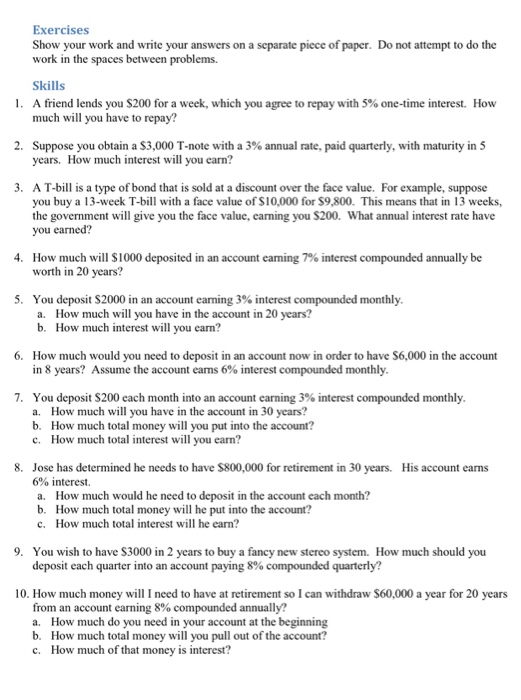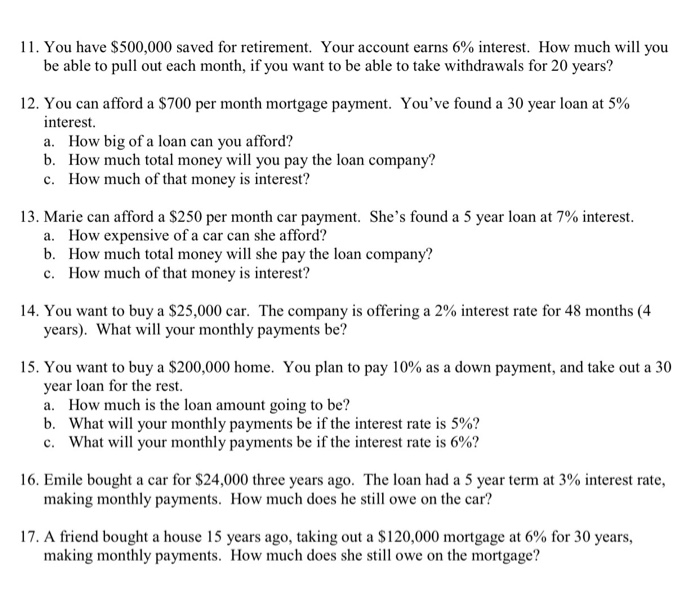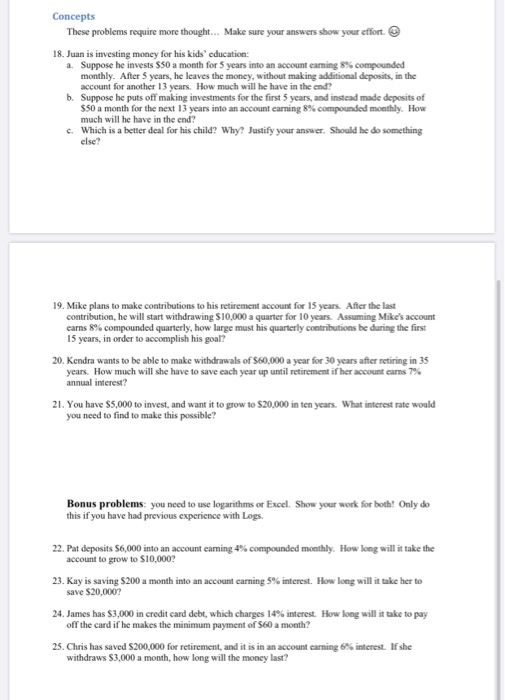Exercises Show your work and write your answers on a separate piece of paper. Do not attempt to do the work in the spaces between problems. Skills 1. A friend lends you $200 for a week, which you agree to repay with 5% one-time interest. How much will you have to repay? 2. Suppose you obtain a $3,000 T-note with a 3% annual rate, paid quarterly, with maturity in 5 years. How much interest will you earn? 3. A T-bill is a type of bond that is sold at a discount over the face value. For example, suppose you buy a 13-Week T-bill with a face value of $10,000 for $9,800. This means that in 13 weeks, the government will give you the face value, carning you $200. What annual interest rate have you earned? 4. How much will $1000 deposited in an account eaming 7% interest compounded annually be worth in 20 years? 5. You deposit S2000 in an account earning 3% interest compounded monthly a. How much will you have in the account in 20 years? b. How much interest will you carn? 6. How much would you need to deposit in an account now in order to have $6,000 in the account in 8 years? Assume the account eams 6% interest compounded monthly. 7. You deposit $200 each month into an account earning 3% interest compounded monthly. a. How much will you have in the account in 30 years? b. How much total money will you put into the account? c. How much total interest will you earn? 8. Jose has determined he needs to have $800,000 for retirement in 30 years. His account earns 6% interest a. How much would he need to deposit in the account each month? b. How much total money will he put into the account? c. How much total interest will he earn? 9. You wish to have $3000 in 2 years to buy a fancy new stereo system. How much should you deposit each quarter into an account paying 8% compounded quarterly? 10. How much money will I need to have at retirement so I can withdraw $60,000 a year for 20 years from an account earning 8% compounded annually? a. How much do you need in your account at the beginning b. How much total money will you pull out of the account? c. How much of that money is interest? 11. You have $500,000 saved for retirement. Your account earns 6% interest. How much will you be able to pull out each month, if you want to be able to take withdrawals for 20 years? 12. You can afford a $700 per month mortgage payment. You've found a 30 year loan at 5% interest a. How big of a loan can you afford? b. How much total money will you pay the loan company? c. How much of that money is interest? 13. Marie can afford a $250 per month car payment. She's found a 5 year loan at 7% interest. a. How expensive of a car can she afford? b. How much total money will she pay the loan company? c. How much of that money is interest? 14. You want to buy a $25,000 car. The company is offering a 2% interest rate for 48 months (4 years). What will your monthly payments be? 15. You want to buy a $200,000 home. You plan to pay 10% as a down payment, and take out a 30 year loan for the rest a. How much is the loan amount going to be? b. What will your monthly payments be if the interest rate is 5%? c. What will your monthly payments be if the interest rate is 6%? 16. Emile bought a car for $24,000 three years ago. The loan had a 5 year term at 3% interest rate, making monthly payments. How much does he still owe on the car? 17. A friend bought a house 15 years ago, taking out a $120,000 mortgage at 6% for 30 years, making monthly payments. How much does she still owe on the mortgage? Concepts These problems require more thought... Make sure your answers show your effort 18. Juan is investing money for his kids' education: 2. Suppose he invests SS0 a month for 5 years into an account caring 8% compounded monthly. After 5 years, he leaves the money, without making additional deposits, in the account for another 13 years. How much will he have in the end? b. Suppose he puts off making investments for the first 5 years, and instead made deposits of $50 a month for the next 13 years into an account earning 8% compounded monthly. How much will he have in the end? c. Which is a better deal for his child? Why? Justify your answer. Should he do something else? 19. Mike plans to make contributions to his retirement account for 15 years. After the last contribution, he will start withdrawing S10,000 a quarter for 10 years. Assuming Mike's account carns 8% compounded quarterly, how large must his quarterly contributions be during the first 15 years, in order to accomplish his goal? 20. Kendra wants to be able to make withdrawals of $60,000 a year for 30 years after retiring in 35 years. How much will she have to save each year up until retirement if her account earns 7% annual interest? 21. You have $5,000 to invest, and want it to grow to $20,000 in ten years. What interest rate would you need to find to make this possible? Bonus problems you need to use logarithms or Excel. Show your work for both! Only do this if you have had previous experience with Logs. 22. Pat deposits 56,000 into an account eaming 4% compounded monthly. How long will it take the account to grow to $10,000? 23. Kay is saving $200 a month into an account earning 5% interest. How long will it take her to save $20,000? 24. James has $3,000 in credit card debt, which charges 14% interest. How long will it take to pay off the card if he makes the minimum payment of S60 a month? 25. Chris has saved S200,000 for retirement, and it is in an account carning 6% interest. If she withdraws $3,000 a month, how long will the money last









